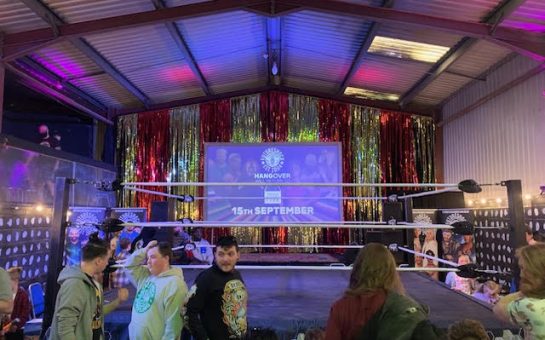More than one billion animals were killed for human consumption in the UK in 2021, official government data has revealed.
The data from the Department for Environment, Food and Rural Affairs includes almost 27 million cattle, pigs and sheep – a decrease of more than 5% from 2020.
Reasons for the decrease include waning demand from China – who are a key importer of British pig meat – and the national breeding flock of lamb being the smallest size on record.
The number of slaughtered livestock has fluctuated between 28 and 29 million for the last seven years and are now at their lowest point since 2010.
A change in eating habits may suggest these numbers could continue to decrease in the coming years, as a survey conducted by Finder shows around 7.2 million British adults now follow a meat-free diet – while a further 8.8 million plan to give up meat in 2022.
The survey also shows 1.6 million now follow a full vegan diet – equal to 3% of the population and more than double the amount in 2019.
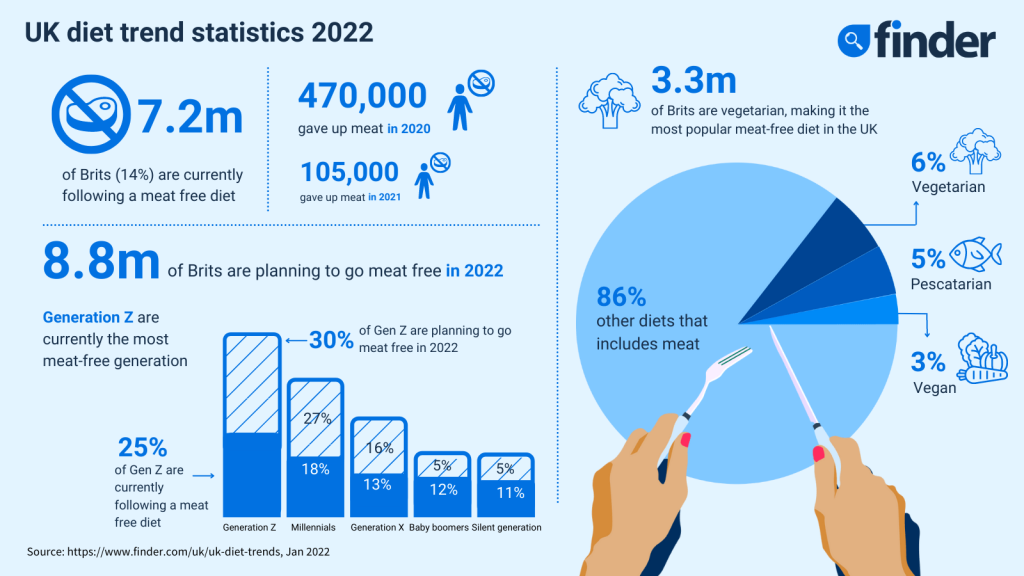
The plant-based food market has experienced a surge in recent years as meat alternatives have very much entered the mainstream.
Between 2014 and 2019 sales of plant-based foods in the UK grew 40% – from £582m to an estimated £816m – according to market analysis firm Mintel.
Here in Manchester there are now more than 50 vegan or vegetarian eateries within five miles of the city centre.
Chef Martin Mellors has run Mod’s Vegan Café at The Thirsty Scholar pub since 2009 and is an admin of the Manchester Vegan Society Facebook group.
He said: “There’s a plethora of all new places opening so it’s a lot easier now to eat out – as a vegetarian/vegan people it’s great, there’s a lot more options.
“We were the first vegan food-led pub in Manchester, then in the last five years it’s gone through the roof.”
He believes this is partly due to the expansion of meat-free food into supermarkets opening people’s eyes and helping them realise that meat-free does not necessarily mean low quality.
While a percentage of people want to go meat-free for health or animal rights reasons, the vegan chef and DJ believes social media has also played a large part in the vegan boom.
He feels that many of those in what he describes as the Instagram generation are simply jumping on the latest food and lifestyle trend.
The number of people signing up to take part in Veganuary – where people pledge to go meat-free for the first month of the year – reached almost 630,000 this year, more than a 13% increase from 2021.

Martin sees veganism entering the mainstream as a double-edged sword, as its spread into the bigger establishments and fast food chains creates more competition for independent businesses like his.
He said: “The options are brilliant for ordinary vegetarian/vegan people, but business-wise us independents are being squeezed by the big people.
“It has been good for business and it’s better now than it has been, but most people still give most of their money to ‘the man’.
“It’s easier for people to go out six days a week and eat six different things as opposed to hunting down that local vegetarian/vegan shop and supporting them.”
The increased demand for meat alternatives has led to most fast food chains now offering vegan options, with McDonald’s McPlant burger the latest meat-alternative to burst onto the scene earlier this year.
Delivery company Deliveroo revealed vegan orders through their service increased by 163% between January 2020 and January 2021.
Despite its surge in popularity, Martin still experiences apprehension or reluctance to try vegan food amongst some of his customers.
“It stems from that old style stigma about it being a bit wussy” he said, “but times are changing and people now are generally more accepting.”
Manchester Pig Save
Approximately 10 million pigs are slaughtered for human consumption every year in the UK.
Government data shows 952,000 pigs were killed in December 2021 alone.
Studies have proved that pigs are highly intelligent, inquisitive and social animals that learn quickly and in many learning tests can out-perform dogs and a three-year-old child.
In 2021, scientists in the USA showed that with the right training they can be taught to play a joystick-operated video game with their snout.
So if we are a nation of animal lovers, why do we turn a blind eye to the slaughter of millions of pigs – or other ‘edible’ animals?
MM spoke to activist group Manchester Pig Save to discuss what it does and why making the connection between farm and food can be so challenging.
One of the many offshoots of the global Pig Save movement which began in 2010 in Toronto, Canada, Manchester Pig Save has held vigils at Ashton-under-Lyne slaughterhouse Tulip Meats since 2016.
It describes itself as a peaceful, love-based and inclusive social justice movement who stand against the oppression of defenceless animals.
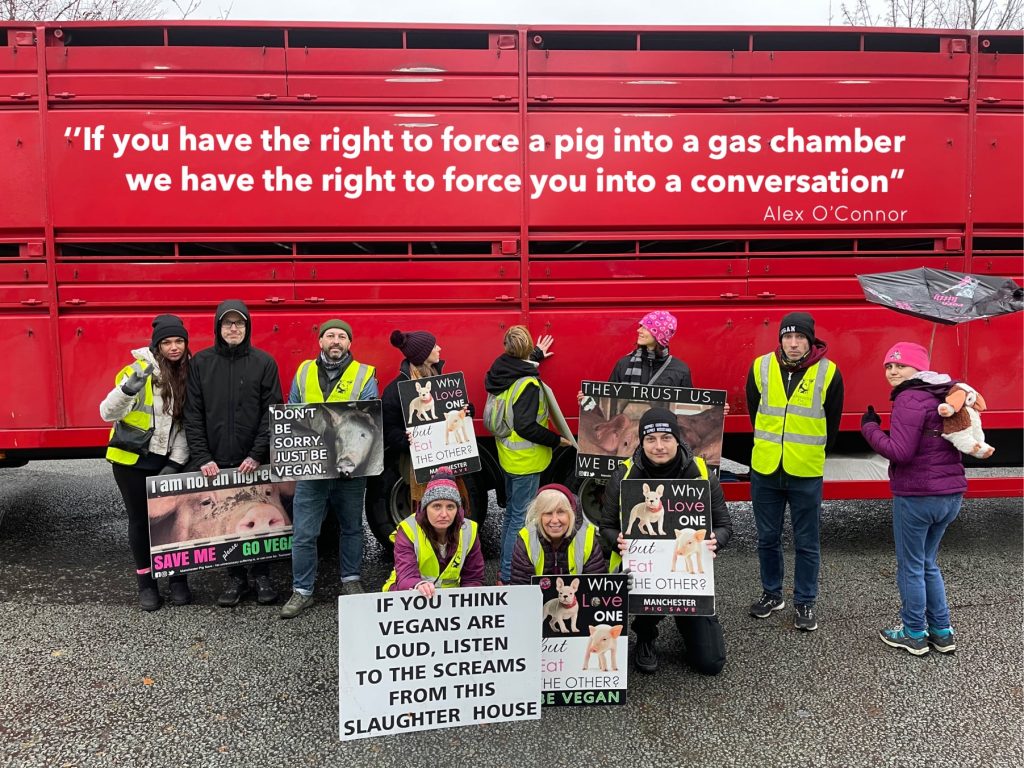
Image source: Manchester Pig Save
Its aim is to help people make the connection between the food on their plate and the living, feeling animal it once was.
Group organiser Arun Patel feels we are conditioned from birth that we should be eating certain animals while loving others.
He said: “From a young age, every fabric of society tells us that this is natural and normal – it is an inherent bias we are raised with.
“Animals fear the same and feel the same [as humans], there is no difference.”
Tracy, one of the group’s organisers, said: “We go to the trucks, get footage, talk to the pigs and give them a little scratch on the nose, and share that so people realise their bacon and sausages went through a hell of a lot to be available to them.
“I could have talked to and stroked the nose of a pig that my friend ends up eating, and we want people to think about that.”
When asked about the emotions of coming face to face with the imprisoned animals, Tracy said that some of the pigs’ fear is evident, while others will not be conscious of the fate that awaits them and it is only on their entrance to the slaughterhouse that the reality becomes clear.
She said: “Considering pigs have a powerful sense of smell, they will definitely be able to smell the blood once they are inside, and that’s where the fear will really kick in.”
If domestic animals like cats or dogs were packed into a truck and transported around the country destined for death as these pigs are, there would likely be public outrage.
A change.org petition against China’s infamous Yulin Dog Meat Festival gained more than five million signatures in 2021, yet the number of dogs killed there is dwarfed by the number of farmed animals killed in the UK every day.
Though conceding their actions do not save the pigs from death, the Pig Save movement spreads awareness to help prevent future pigs from being bred to become food.
Comparing the plight of farmed animals to the civil rights movement and the suffragettes, Arun said it is difficult to undo the knowledge that is engrained in our society and re-evaluate with a fresh pair of eyes.
He said: “I’m not an animal lover, I’m against injustice. Slavery is gone, we’ve addressed women’s rights and gay rights – this is the social justice issue of our time.
“The analogy ‘it’s just a pig’ – if you check the history books, when it was to do with slavery, the natural response was ‘yes, but they are black’. When it came to women having the vote, ‘yes, but they are women’.
“Animals are not the same as humans, but they have a right to a life, they have a purpose for being and that is not to be bred to end up on our plates.”
When asked how he feels about the huge numbers of slaughtered farm animals in the UK, Arun said: “I’m not a tearful person, but seeing that in ink burst me into tears.
“I live in a society that is perpetrating one of the biggest massacres you will ever see.”
Arun feels it is our obligation and duty as a species to look at the pigs being transported and do everything we can to make people aware of the atrocities, rather than allowing the complacency to let it happen.
He said nothing is more important to realising the scale of the issue than seeing it for yourself and attending a vigil is just one thing a person can do.
“I can talk to a thousand people and they can walk away and not be active or make a change.
“There’s a difference to hearing about an atrocity and witnessing it. When you witness an atrocity and you feel and smell it – it changes you.”
In the last two years humans have killed 140 billion farmed animals globally.
This means in the last two years the number of animals slaughtered is more than the 117 billion humans who have ever lived.
Arun believes that in the future people will look back and wonder why we slaughtered so many animals, and for so long
“The future won’t be like this, but I’m complicit because I live in this period.
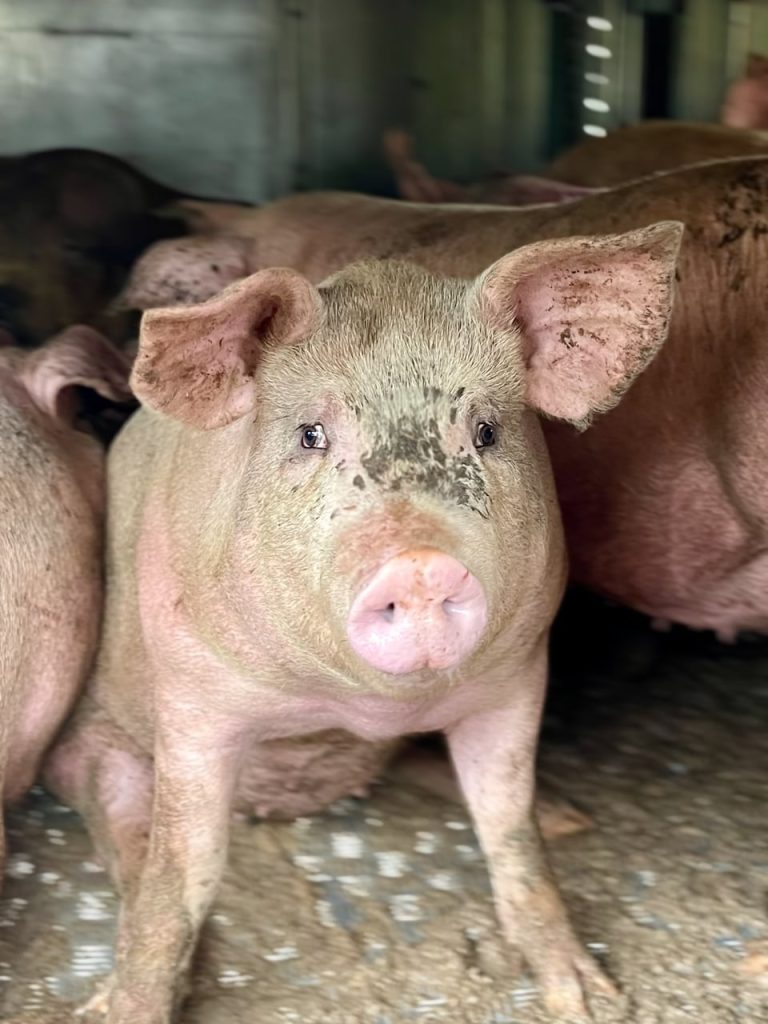
Image source: Manchester Pig Save
“Choosing to go meat-free is not enough, we have to make a change.”
When asked how what he thinks about the decrease in the number of butchers in the UK and the threat of a meat-free diet to the meat processing industry and the 97,000 jobs it accounts for, Arun made the comparison with the transferring of jobs between other sectors.
He said: “Did you think about Blockbusters before you signed up for Netflix? Did you think when you stopped shopping at Debenhams they would close?
“Jobs will always get transferred – if we didn’t transfer jobs we would still be in the caves, we would still have horse and carts.
“Why is it when jobs move from one sector to another, when everything evolves, it’s called evolution, but when it comes to farming it’s ‘no, we’re going to do farming forever’.
“Why is that disconnect and bias there? We should change and grow.”
Manchester Pig Save welcome anyone to contact them or join their vigils, regardless of their lifestyle or dietary choices.
Tracy said: “We’re only a message away, so if anyone has any questions about the vigil or they just want to talk we’re more than happy to talk them through things.
“We are a love based, inclusive group, and that includes people who eat meat.”
You can find out more and contact Manchester Pig Save via their Facebook page.
The meat of the issue
Over the last 25 years the number of independent butchers in the UK has reduced by 60%, according to the ONS.
Though this is primarily due to a change in shopping trends rather than the increase of people following a meat-free diet, if more people choose to abstain from eating animals, what would that mean for this traditional and historic trade which has been part of our society for hundreds of years?
For a different perspective on the increase of vegans and the issues surrounding the meat industry, MM spoke to William, head butcher at Manchester’s The Butcher’s Quarter, an independent, artisan butcher with locations in the Northern Quarter and Deansgate.
When asked what he thinks about the views of activist groups like Manchester Pig Save, he said: “Humans have been eating meat for years, it’s all part of the food chain.
“There is no such thing as being sustainable with anything, whether it’s meat or vegetables.
“If you think of a footprint point of view – I buy beef from two farms in Cheshire which are 25 miles away, but you could buy an avocado that’s been shipped from South America.”
The UK produces approximately two million tonnes of beef, pork and sheep meat each year and more than a quarter of this is exported, according to the British Meat Processors Association.
More than 1.3 million tonnes of the same meat is imported.
Despite the increase of people choosing a meat-free lifestyle and those who view the rights of animals as equal to humans, William does not think the world turning vegan would be the right thing to do.
He said: “You could start growing all the vegetables and nuts in the world, it still wouldn’t be able to feed everybody.
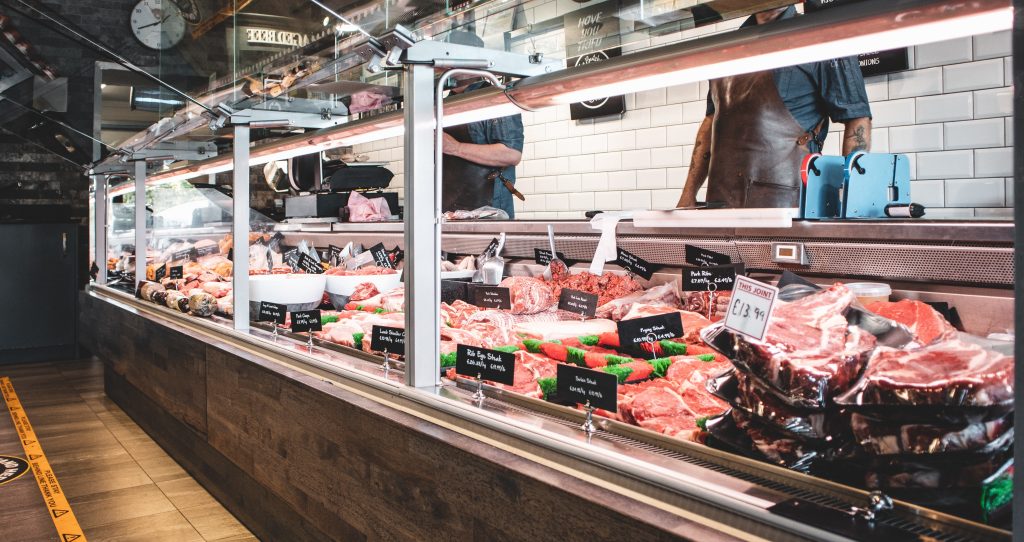
“There’s not enough space in the world for it – if you think about it, you’d start having to cut forests down to make room for vegetation to actually feed people, so ultimately you’d be causing more of a problem.”
According to the United Nations Food and Agriculture Organization, livestock is the world’s largest user of land resources, taking up more than a quarter of the Earth’s land.
More than a third of all UK land is used for animal agriculture, while almost three quarters of EU agricultural land is dedicated to feeding livestock.
A study published earlier this month suggests a total elimination of meat production around the world in 15 years could reduce global carbon emissions by 68% and take us halfway to limiting global warming to 2C, the minimum threshold for avoiding the worst impacts of climate change.
The new study, published in the peer-reviewed journal PLoS Climate, was conducted by Michael Eisen, professor of molecular and cell biology at the University of California, Berkeley, and Patrick Brown, professor emeritus of biochemistry at Stanford University.
While their plan to abolish the meat production industry within two decades is extreme, the scientists modelled the impact of a global end to livestock farming and suggest if trees were planted on the same land currently used for animal agriculture, they would remove 800 billion tonnes of carbon dioxide from our atmosphere.
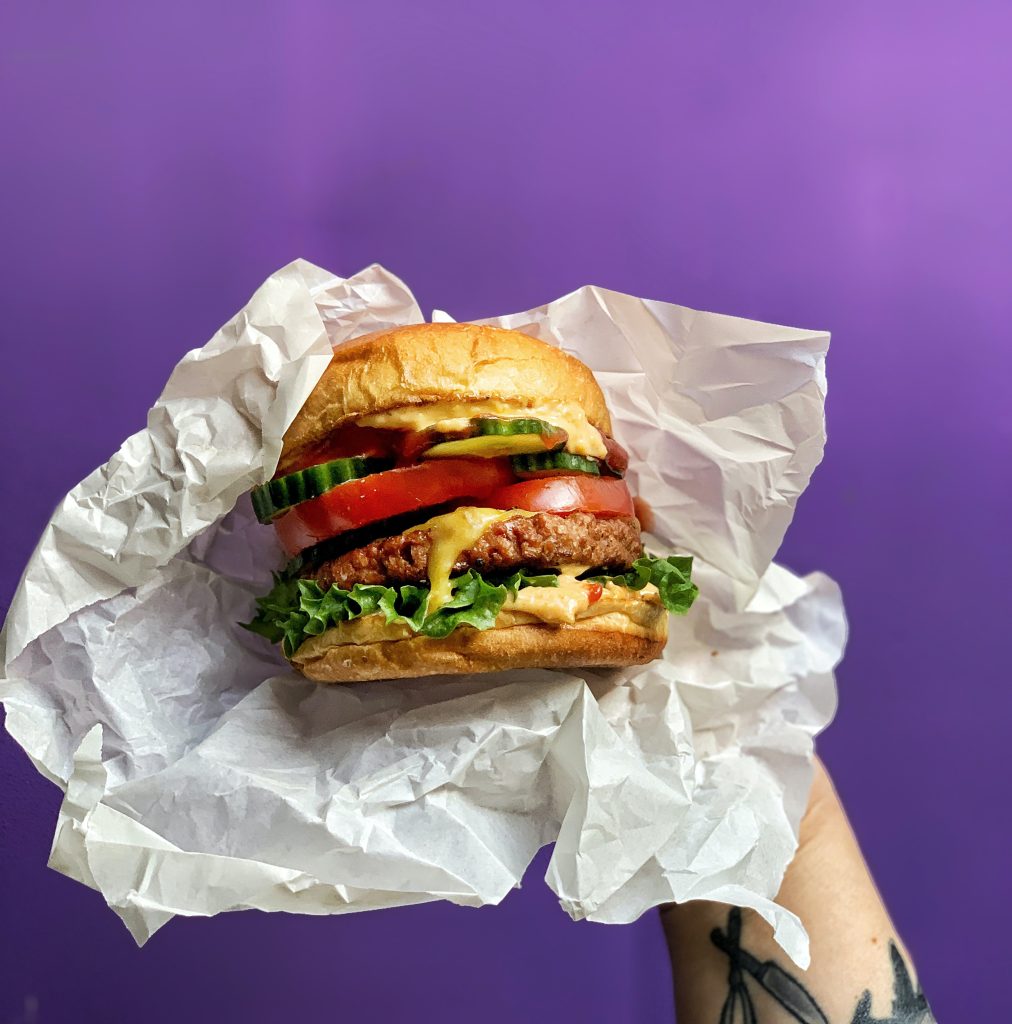
In regards to making the connection between live animals and the meat in his shop, head butcher William said he is able to detach himself from the fact the meat he sells was recently a living being.
When asked what difference he sees between domestic animals and those which are killed for food, he said although all animals are animals, he would not associate killing a cat or dog with killing a pig.
He said: “If I had a cow that lived in my house I think I would be pretty close with it.
“You can love every animal but if you’re raising something from a very young age, you’re obviously going to build a relationship with it.
“If you’re going out to save 15 pigs, you’re not going to be best mates with the pigs are you?
“It’s like anything – if you have a best friend you build relationships, that isn’t just something that happens overnight.”
In response to this, Manchester Pig Save said: “We don’t believe that animals should be exploited and killed based on whether we have a relationship with them.
“We wouldn’t justify exploiting or harming humans just because we don’t have a relationship with them – it’s this mindset that has resulted in atrocities such as slavery, the holocaust and genocides.”
While there’s still a long way to go in recognising the rights of other species and the effects of animal agriculture on our planet, the increase of people following a vegetarian or vegan lifestyle offers a glimmer of hope to the billions of animals that are killed every year.
Read our other recent article on how the fashion industry capitalises from animal poaching.
